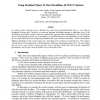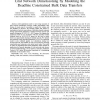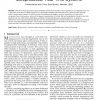5 search results - page 1 / 1 » Using Residual Times to Meet Deadlines in M G C Queues |
NCA
2005
IEEE
13 years 10 months ago
2005
IEEE
In systems where customer service demands are only known probabilistically, there is very little to distinguish between jobs. Therefore, no universal optimum scheduling strategy o...
HPCC
2009
Springer
13 years 9 months ago
2009
Springer
—Grid applications need to move large amounts of data between distributed resources within deterministic time frames. In most cases it is possible to specify the volume and the d...
TPDS
1998
13 years 4 months ago
1998
—Many time-critical applications require predictable performance and tasks in these applications have deadlines to be met. In this paper, we propose an efficient algorithm for no...
CODES
2009
IEEE
13 years 11 months ago
2009
IEEE
Time redundancy (rollback-recovery) and hardware redundancy are commonly used in real-time systems to achieve fault tolerance. From an energy consumption point of view, time redun...
CASES
2005
ACM
13 years 6 months ago
2005
ACM
In Simultaneous Multithreaded (SMT) architectures most hardware resources are shared between threads. This provides a good cost/performance trade-off which renders these architec...



